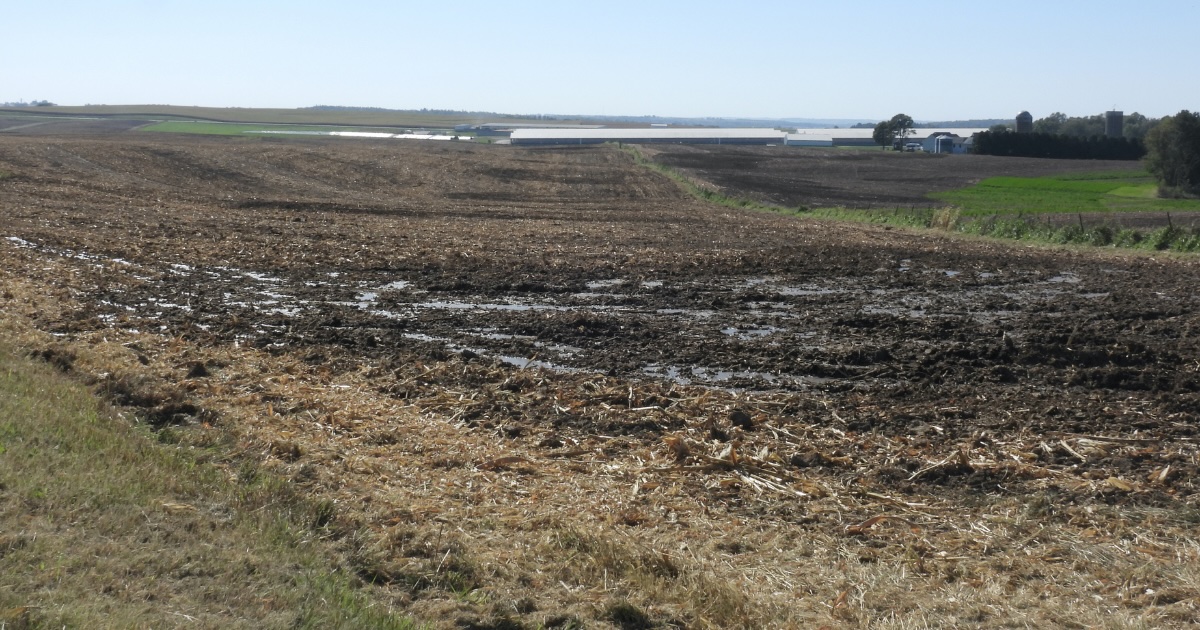Fracking’s Forever Problem: Fifth in a series about the gas industry’s radioactive waste.
When Tom McKnight started working for the oil and gas industry as a truck driver in Ohio more than 10 years ago, he attended an orientation where someone in the class asked about the possibility of radiation exposure from fracking waste. The instructor told them there was more radiation risk from their cell phones than on the job.
“He just broomed it under the table,” McKnight said. “They said it absolutely is not [radioactive].”
McKnight would later learn that the company had misled him: The waste and wastewater generated by fracking can be highly radioactive and toxic, especially in the Marcellus Shale, the formation beneath Pennsylvania, Ohio, West Virginia and New York that supplies fracking wells with gas.
Years later, after he was diagnosed with cancer and doctors found nodules on his lungs, McKnight wondered if his illness was triggered by his time working for the fracking industry. He’ll likely never know the answer to that question. But he wishes he had been warned about the hazards of the waste.
We’re hiring!
Please take a look at the new openings in our newsroom.
See jobs
McKnight isn’t alone, said Billy Randel, a retired truck driver and lead organizer with Truckers Movement for Justice, a group working to improve labor conditions for drivers across the country. He’s met other drivers in the Marcellus region and beyond who say they weren’t told the truth about the contents of the oil and gas waste they were being paid to haul.
“This is the crucial element to this whole issue. They’re not telling drivers what’s in this stuff,” Randel said. “Because they don’t want us to know.”
Experiences like McKnight’s galvanized Truckers Movement for Justice to publicly call for the U.S. Department of Transportation to enforce existing rules for the transport of hazardous materials. The group wants DOT to conduct a safety audit of carriers dealing with oil and gas waste, investigate whether companies are properly labeling the waste and develop safety training for drivers and workers in the industry.
Oil and gas waste is generally not legally considered hazardous in the United States because of an exemption in the federal Resource Conservation and Recovery Act (RCRA). But Randel and environmental activists say the waste created in the fracking process is often toxic enough to exceed the legal thresholds for hazardous materials—it’s just not being classified that way.
Federal law governing hazardous material transport requires extra precautions like warning labels, employee training and emergency response and reporting protocols. The regulations for the movement of hazardous materials on highways are separate from RCRA, which primarily covers disposal.

“Our mapping and data work consistently reveal that oil and gas waste—including radioactive and toxic materials—is being transported without proper hazard classification or oversight,” said Shannon Smith, the executive director at FracTracker, a Pennsylvania-based organization that studies the impacts of oil and gas development in the U.S., which signed the letter alongside environmental groups like Earthjustice, ProtectPT, Oilfield Witness and the Mountain Watershed Association.
FracTracker has “demonstrated significant gaps in federal reporting and tracking” of oil and gas waste, Smith said. “These oversight failures not only expose drivers and first responders to serious hazards but also leave communities unaware and unprotected.”
Patrick Henderson, the vice president for government affairs and communications at the Marcellus Shale Coalition, an industry trade association, said there is “no greater priority for our industry than worker and community safety.” Henderson said the industry follows “strict adherence to modern regulatory standards.”
“Operators follow stringent protocols for handling, managing, and transporting waste— including radioactive screening, characterization, and reporting—and have advanced innovative well construction and water recycling practices to reduce fresh water and disposal need,” he said in a statement to Inside Climate News. Henderson said existing federal and state regulations have “proven to be protective of public health and the environment.”
The Department of Transportation did not respond to requests for comment.
John Quigley, a former secretary of the Pennsylvania Department of Environmental Protection and a fellow at the University of Pennsylvania’s Kleinman Center for Energy Policy, said the workers are “absolutely right to be asking for what they’re asking for.”
This story is funded by readers like you.
Our nonprofit newsroom provides award-winning climate coverage free of charge and advertising. We rely on donations from readers like you to keep going. Please donate now to support our work.
Donate Now
“It’s way past time for this issue to be addressed,” he said. “We have grossly underestimated the risk and therefore not enacted adequate protections.”
The Truckers Movement for Justice letter to DOT contends that drivers “regularly come into contact” with oil and gas waste, including wastewater that splashes on their clothes and is accidentally swallowed. Exposure has “resulted in worker hospitalizations, long-term illness, and deaths.”
Sean Guthrie, a former operations manager at a fracking wastewater plant in West Virginia, said he was unaware of the contents of the water when he worked in the industry. He and his coworkers were often exposed to it. “We’d get it on us, get it on our boots, get it on our pants. There was a time that I remember a valve getting bumped open and I got my head soaked,” he said.
Like McKnight’s, his employers downplayed any dangers in the wastewater. “From everything that I was told, it wasn’t that big of a deal. They said, ‘It’s really nothing to worry about,’” he said. “At the time, we all thought we were doing something good, especially for the environment, the way we were cleaning up the water.”
“We have grossly underestimated the risk and therefore not enacted adequate protections.”
— John Quigley, former secretary of the Pennsylvania Department of Environmental Protection
He was never given protective equipment or specialized training for handling radioactive waste. After 11 years working in the field, Guthrie said he was forced to leave because of health problems related to his breathing. He was diagnosed with COPD, chronic obstructive pulmonary disease. Two of his former coworkers later died of cancer, he said, one of them in his thirties.
“I think it all goes back to not really having a good understanding of what I was being exposed to,” he said.
The long-term health consequences for workers and drivers are likely only just beginning to emerge, Quigley said.
“I really fear for them. I was afraid for them when I was secretary, and that fear hasn’t changed,” he said. Quigley served as secretary of DEP from 2015 to 2016, when the fracking boom in Pennsylvania was still in its early stages. “The risk that they face has absolutely been understated, if it’s been stated at all.”
The lack of proper classification of the waste is also dangerous for the general public, Truckers Movement for Justice argues. In Pennsylvania, trucks carrying oil and gas waste and wastewater crisscross the state, traveling from well pads concentrated in the west to landfills in the north and injection wells in Ohio. These trucks are not usually labeled as “hazardous,” Randel said, which increases the risks when there is an accident. The letter describes recent incidents in Pennsylvania, Ohio and North Dakota, in which thousands of gallons of fracking wastewater were spilled.
“They’re driving it through our towns. [The trucks] leak. They contaminated our reservoir,” said Jill Hunkler, the founder of Ohio Valley Allies, an environmental advocacy organization that co-signed the letter with Truckers Movement for Justice.
In 2014, a truck carrying oil and gas wastewater, sometimes called “brine” because of its saltiness, crashed in Barnesville, Ohio. The resulting spill leaked through a livestock field into a stream and then into the town’s reservoir. Testing by the Ohio Environmental Protection Agency later found elevated levels of radium in the reservoir, though not exceeding drinking-water standards.
Millions of gallons of wastewater are trucked from Pennsylvania into Ohio, where the water is disposed of in underground injection wells.
“At the very minimum, we have to acknowledge the true costs and harms in what this stuff actually is and how dangerous it is,” Hunkler said. “And we have to start by protecting the workers.”
Awareness about the potential dangers of oil and gas waste is spreading in the Marcellus and in the Permian Basin, the vast reserve in Texas and New Mexico, Randel said.
“Our drivers are beginning to understand, ‘Hey, wait a minute, that stuff is killing me,’” he said. “The industry has gotten away with a crime against its drivers, the oil field workers and the communities that support the industry. This has to stop.”
He compared the impacts of the fracking industry on Appalachia to the damage wrought by decades of coal mining, a comparison that Quigley echoed.
“That is the classic trajectory of resource extraction,” Quigley said. “The industrial activity far outpaces the understanding of its potential impacts.”
Mining has left Pennsylvania with a legacy of environmental pollution and serious health issues like black lung, and fracking is following a similar path, he said.
“We look at this as a war,” Randel said. “A very, very long, step-by-step process to take this industry down for what it’s done to the workers, their communities and, most of all, to Mother Earth.”
About This Story
Perhaps you noticed: This story, like all the news we publish, is free to read. That’s because Inside Climate News is a 501c3 nonprofit organization. We do not charge a subscription fee, lock our news behind a paywall, or clutter our website with ads. We make our news on climate and the environment freely available to you and anyone who wants it.
That’s not all. We also share our news for free with scores of other media organizations around the country. Many of them can’t afford to do environmental journalism of their own. We’ve built bureaus from coast to coast to report local stories, collaborate with local newsrooms and co-publish articles so that this vital work is shared as widely as possible.
Two of us launched ICN in 2007. Six years later we earned a Pulitzer Prize for National Reporting, and now we run the oldest and largest dedicated climate newsroom in the nation. We tell the story in all its complexity. We hold polluters accountable. We expose environmental injustice. We debunk misinformation. We scrutinize solutions and inspire action.
Donations from readers like you fund every aspect of what we do. If you don’t already, will you support our ongoing work, our reporting on the biggest crisis facing our planet, and help us reach even more readers in more places?
Please take a moment to make a tax-deductible donation. Every one of them makes a difference.
Thank you,

















